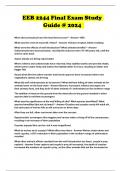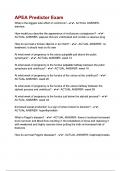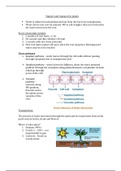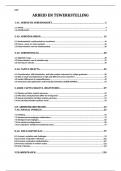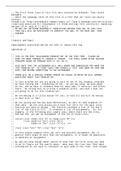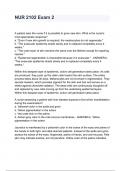EEB 2244 Final Exam Study
Guide @ 2024
When did connecticut have the least forest cover? - Answer 1850
What was the event of mount St. Helen? - Answer Volcano erupted, killed errytlang
What were the effects of wolf introduction? What animals benefits? - Answer
Cottonwoods have bounced back, recently the only tres were 70-100 years old, until the
wolves came back
Aspen stands are being rejuvenated
Where willows and cottonwoods have returned, they stabilize banks and provide shade,
which lowers water temp and makes the habitat better for trout, resulting in better and
bigger fish
Sound birds like the yellow warmer and lincoln sparrow have increased where new
vegetations stands are thriving
What did wolf reintroduction do to beavers? What did their killing of other animals do for
animals lower on the food chain - Answer Beavers increased, willows and aspen are
their primary food, and they built 10 dams instead of 1 beforehand on the northern range
The addition of meat on the ground from the dead elks on the ground resulted in other
species able to eat them (scavengers
What was the significance of the wolf killing of elks? What species benefitted? What
species benefitted (but not rly lmao)? - Answer Grizzlies and coyotes rarely kill adult elk,
but each pack of wolves kills an elk every two or three days
After they are full, other carnivores take over the carcass
Opportunistic scavengers like magpies and ravens make a living off of the caracassses,
resulting in an increase of their population
Coyotes enjoyed this carrion, but it was insignificant
What do wolves do to coyotes? What effect was there - Answer Wolves chase down and
mark coyotes, a 50% reduction in their population in the northern range of yellowstone
resulted
What other indirect effects resulted from the wolf introduction (on foxes, coyote's prey,
raptors) - Answer Foxes raptors and coyote's prey all increased, the death of coyotes
increased the numbers of coyote's prey, so the other animals that eat the increased as
,well as them increasing as well
Raptors are predatory terns that eat rodents
What was the landscape difference between before and after wolf reintroduction? -
Answer Wolf reintroduction resulted in the killing of animals, lots of dead bois, but grass
returned, ravens returned, the grass was back too, overgrazing was gone
The Landscape looked very different
What should be the effect of wolf reintroduction in the YNP on rodent numbers - Answer
Rodents increased!
What type of predator is a wolf, what was triggered when they were introduced? -
Answer Wolves are an apex predator
Their reintroduction triggered a trophic cascade
Direct and indirect effects percolated throughout the YNP system
What are community dynamics? - Answer Communities are in a continual state of flux
Minor and major disturbances drive changes in community composition, causing
mortality and growth of various species present
Disturbances can be abrupt, like a natural disaster and such
More gradual, continuous changes in climate and other environmental factors also
cause changes
What is community succession? What is the definition of a disturbance? - Answer The
change (often predictable() that occurs in the structure and composition of the
community following disturbance which may lead back to pre-disturbance conditions
Disturbances are events that remove organisms from a community (via mortality) and
open up space for new individuals
Sometimes new species will come, sometimes old species will return instead
What was the major disturbance example given in class? What happened after? -
Answer Krakatau killed many organisms, only small creatures and bacteria were left,
the island was recolonized by other species
What are the Successional change terms? (2) - Answer Each of the various stages of
succession us a sere
The final equilibrium sere is called the "climax community", in most communities
because of period disturbances and recovery the climax is a fleeting (transient) stage in
the overall dynamics
Example: oak-hornbeam forest in poland
,What was the climax state example given in class? - Answer Forest was cleared, then
you get more trees and eventually you get quite large trees errywhere
Who was the pioneer of succession? - Answer F.E. Clements!
What are the categories of succession? - Answer Primary succession: Community
establishment and dynamics that occur on newly formed habitats lacking plants of
animals ex: (Sand dunes kava flow and new volcanoes, landslides, receding glaciers)
Secondary succession: Changes in community composition and structure following a
disturbance (Fire, wind storms, floods, agriculture abandonment)
What was the glacier example of primary succession? - Answer Glaciers were retreating
in Alaska and elsewhere in the arctic region, high mountains elsewhere in the world,
Also events following the end of the last ice age (15,000 years ago)
What was the Glacier Bay example? (succession) - Answer Primary succession
triggered by glacial retreating, you go from moss and fireweed all the way to
hemlock-spruce in 200 years after the retreat
As time goes on the short bois get shaded out by the tall bois, eventually you get to the
ultimate big boy forests
What is self-thinning? - Answer Trees get shaded out and die reducing the number of
trees, results in equally distribution
What is the soil pH change along the chain of primary succession? - Answer 8.0 pH to
4.8
Because of needle deposition/litter
What is old field succession? (secondary succession), 1700s, 1800s, late 1800s, Early
1900s) - Answer Secondary succession, before european contact NE was very foresty
and cool
In the early-mid 1700s: Agriculturists moved in and cleared fields, resulting in livestock
grazing, death of all the tree bois
In the early mid 1800s: Agriculturists fully developed the land, we had the highest
population growth at this point, we ate well, were the tallest nation in the world. There
was a malthusian event and we declined
late 1800s: After the civil war, there was a lot of space for the european
children/grandchildren and etc. to move west. The population of the rural areas
crashed, The midwest allowed people to snag food and stuff so they didn't need NE
anymore.
Early 1900s/1920s-1930s: Taller trees and such took over.
, Why do we have stone walls in NE a lot? - Answer Glaciers deposited a lot of boulders
after the ice age, this resulted in stone wall son
What is the successional sequence in C-S New England - Answer 0 years: Abandoned
fields started it
2-5 years: Annual weeds, small grasses
Next 10 years: Pitch pine, pasture juniper, gray birch
Next 25 years: Scrub oak, white pine, red cedar
100-250 years: Oaks and hickories (on drier warmer sites)
Maple Beech hemlock, yellow birch (on cooler moisture sites)
What is bog succession? - Answer When a lake turns into a bog, an example of primary
succession
Which of the following is an example of secondary succession? - Answer Forest fire
What is the Connell-slatyer model? What is facilitation? What is an example? - Answer
Facilitation: Certain early pioneer species invade the site and subsequently improve the
conditions (facilitate) for later species which in turn may out-compete pioneers
Examples include nitrogen fixing species or species that build up soil,
Species build up soil which allows better woody species to come, and eventually shade
out primary species
Nitrogen fixing species create nitrogen that allows species to come and again shade
them out and outcompete them.
it matches the clements early view of succession
How does the alder facilitate competition? - Answer Adding nitrogen to the soil
Guide @ 2024
When did connecticut have the least forest cover? - Answer 1850
What was the event of mount St. Helen? - Answer Volcano erupted, killed errytlang
What were the effects of wolf introduction? What animals benefits? - Answer
Cottonwoods have bounced back, recently the only tres were 70-100 years old, until the
wolves came back
Aspen stands are being rejuvenated
Where willows and cottonwoods have returned, they stabilize banks and provide shade,
which lowers water temp and makes the habitat better for trout, resulting in better and
bigger fish
Sound birds like the yellow warmer and lincoln sparrow have increased where new
vegetations stands are thriving
What did wolf reintroduction do to beavers? What did their killing of other animals do for
animals lower on the food chain - Answer Beavers increased, willows and aspen are
their primary food, and they built 10 dams instead of 1 beforehand on the northern range
The addition of meat on the ground from the dead elks on the ground resulted in other
species able to eat them (scavengers
What was the significance of the wolf killing of elks? What species benefitted? What
species benefitted (but not rly lmao)? - Answer Grizzlies and coyotes rarely kill adult elk,
but each pack of wolves kills an elk every two or three days
After they are full, other carnivores take over the carcass
Opportunistic scavengers like magpies and ravens make a living off of the caracassses,
resulting in an increase of their population
Coyotes enjoyed this carrion, but it was insignificant
What do wolves do to coyotes? What effect was there - Answer Wolves chase down and
mark coyotes, a 50% reduction in their population in the northern range of yellowstone
resulted
What other indirect effects resulted from the wolf introduction (on foxes, coyote's prey,
raptors) - Answer Foxes raptors and coyote's prey all increased, the death of coyotes
increased the numbers of coyote's prey, so the other animals that eat the increased as
,well as them increasing as well
Raptors are predatory terns that eat rodents
What was the landscape difference between before and after wolf reintroduction? -
Answer Wolf reintroduction resulted in the killing of animals, lots of dead bois, but grass
returned, ravens returned, the grass was back too, overgrazing was gone
The Landscape looked very different
What should be the effect of wolf reintroduction in the YNP on rodent numbers - Answer
Rodents increased!
What type of predator is a wolf, what was triggered when they were introduced? -
Answer Wolves are an apex predator
Their reintroduction triggered a trophic cascade
Direct and indirect effects percolated throughout the YNP system
What are community dynamics? - Answer Communities are in a continual state of flux
Minor and major disturbances drive changes in community composition, causing
mortality and growth of various species present
Disturbances can be abrupt, like a natural disaster and such
More gradual, continuous changes in climate and other environmental factors also
cause changes
What is community succession? What is the definition of a disturbance? - Answer The
change (often predictable() that occurs in the structure and composition of the
community following disturbance which may lead back to pre-disturbance conditions
Disturbances are events that remove organisms from a community (via mortality) and
open up space for new individuals
Sometimes new species will come, sometimes old species will return instead
What was the major disturbance example given in class? What happened after? -
Answer Krakatau killed many organisms, only small creatures and bacteria were left,
the island was recolonized by other species
What are the Successional change terms? (2) - Answer Each of the various stages of
succession us a sere
The final equilibrium sere is called the "climax community", in most communities
because of period disturbances and recovery the climax is a fleeting (transient) stage in
the overall dynamics
Example: oak-hornbeam forest in poland
,What was the climax state example given in class? - Answer Forest was cleared, then
you get more trees and eventually you get quite large trees errywhere
Who was the pioneer of succession? - Answer F.E. Clements!
What are the categories of succession? - Answer Primary succession: Community
establishment and dynamics that occur on newly formed habitats lacking plants of
animals ex: (Sand dunes kava flow and new volcanoes, landslides, receding glaciers)
Secondary succession: Changes in community composition and structure following a
disturbance (Fire, wind storms, floods, agriculture abandonment)
What was the glacier example of primary succession? - Answer Glaciers were retreating
in Alaska and elsewhere in the arctic region, high mountains elsewhere in the world,
Also events following the end of the last ice age (15,000 years ago)
What was the Glacier Bay example? (succession) - Answer Primary succession
triggered by glacial retreating, you go from moss and fireweed all the way to
hemlock-spruce in 200 years after the retreat
As time goes on the short bois get shaded out by the tall bois, eventually you get to the
ultimate big boy forests
What is self-thinning? - Answer Trees get shaded out and die reducing the number of
trees, results in equally distribution
What is the soil pH change along the chain of primary succession? - Answer 8.0 pH to
4.8
Because of needle deposition/litter
What is old field succession? (secondary succession), 1700s, 1800s, late 1800s, Early
1900s) - Answer Secondary succession, before european contact NE was very foresty
and cool
In the early-mid 1700s: Agriculturists moved in and cleared fields, resulting in livestock
grazing, death of all the tree bois
In the early mid 1800s: Agriculturists fully developed the land, we had the highest
population growth at this point, we ate well, were the tallest nation in the world. There
was a malthusian event and we declined
late 1800s: After the civil war, there was a lot of space for the european
children/grandchildren and etc. to move west. The population of the rural areas
crashed, The midwest allowed people to snag food and stuff so they didn't need NE
anymore.
Early 1900s/1920s-1930s: Taller trees and such took over.
, Why do we have stone walls in NE a lot? - Answer Glaciers deposited a lot of boulders
after the ice age, this resulted in stone wall son
What is the successional sequence in C-S New England - Answer 0 years: Abandoned
fields started it
2-5 years: Annual weeds, small grasses
Next 10 years: Pitch pine, pasture juniper, gray birch
Next 25 years: Scrub oak, white pine, red cedar
100-250 years: Oaks and hickories (on drier warmer sites)
Maple Beech hemlock, yellow birch (on cooler moisture sites)
What is bog succession? - Answer When a lake turns into a bog, an example of primary
succession
Which of the following is an example of secondary succession? - Answer Forest fire
What is the Connell-slatyer model? What is facilitation? What is an example? - Answer
Facilitation: Certain early pioneer species invade the site and subsequently improve the
conditions (facilitate) for later species which in turn may out-compete pioneers
Examples include nitrogen fixing species or species that build up soil,
Species build up soil which allows better woody species to come, and eventually shade
out primary species
Nitrogen fixing species create nitrogen that allows species to come and again shade
them out and outcompete them.
it matches the clements early view of succession
How does the alder facilitate competition? - Answer Adding nitrogen to the soil

